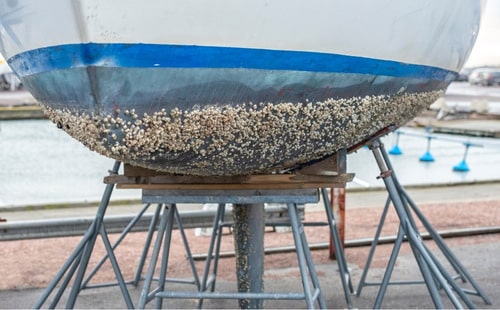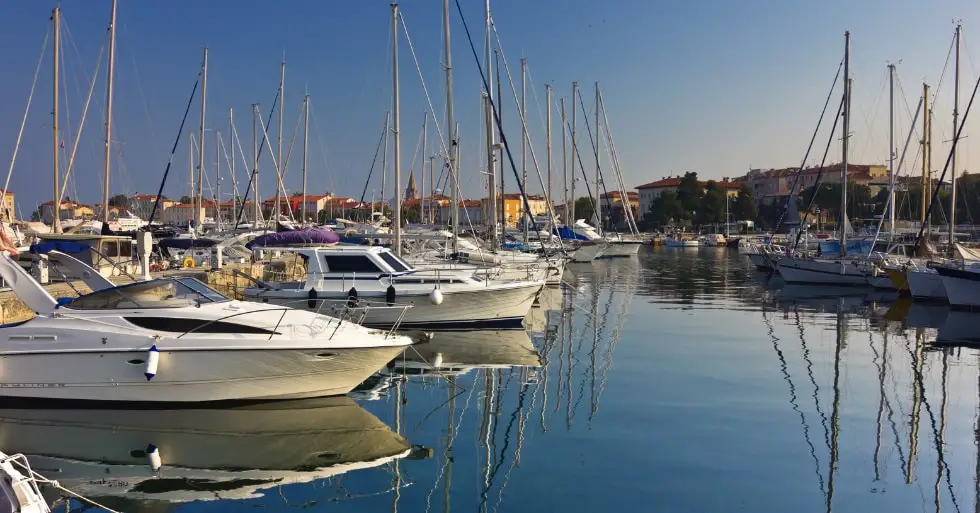Water can be very harmful to boats if they are left in it for too long without proper precautions. Although saltwater is much more corrosive than freshwater, both can cause damage to your boat.
You should not let your boat sit still in salt water for any more than 7-10 days (especially in high-fouling areas). After that, barnacles may start latching onto your hull. After 3-4 weeks, these barnacles may start blistering your hull and will be a pain to get off.
If you run your boat on plane often, you may be able to double or triple the amount of time you can leave it in the water. However, if you start to notice any marine growth on your hull, get it out and clean it off as soon as possible.
Many people who leave their boats at a marina hire a barnacle cleaner to dive down below their boat and clean the hull once every 1-3 months.
Factors that determine how long a boat can sit in saltwater
Not all saltwater is the same. Depending on where you are, the water may be different in temperature, saltier, or have a higher current. All of these affect how long you should leave your boat in the water.
- Temperature. The warmer the water, the faster algae and barnacles will grow, so places such as southern Florida are much more susceptible to barnacle growth than say, Road Island.
- Salinity. The saltier the water, the more corrosive it is to your boat. Places such as the southeast US and the Gulf of Mexico coast generally have a pretty high salinity. Meanwhile, most of North America’s Pacific coast is quite low. Check out the salinity map here.
- Current. The higher the current, the more likely foiling will occur. Marine growth such as barnacles love places with high current, and a perfect place for them to enjoy it is on your hull.
No matter where you’re boating in the world, if it’s in saltwater you must do the proper precautions to keep your boat safe (more on that later). However, generally warmer climates (especially Florida) are at a greater risk due to the higher temperature, and many times higher salinity.
How does saltwater damage boats
The main issue you have to worry about in the short term is marine growth such as barnacles on your hull. Although this is not the most damaging way salt water can affect your boat, it’s the quickest. Barnacles will drastically slow down your boat and cause blistering on your gel coat if not properly maintained.
Related article: Barnacles On Your Boat: What You Need To Know

However, you will eventually have to worry most about the corrosive effects of saltwater on your boat. Salt accelerates the wear and tear on almost every surface of your boat. This may start with corrosion of your gel coat, rubber fittings, small screws, and engine parts (source). Later leading to issues such as:
- Weakening of the hull
- Corrosion of metal components
- Mold and mildew growth
- Deterioration of the boat’s finish and gel coat
- Premature Aging
So it’s important to take the proper precautions every single time you use your boat in saltwater.
How to protect your boat from saltwater damage
The best way to protect your boat from the corrosive powers of saltwater include:
- Taking your boat out of the saltwater as much as possible.
- Cleaning your boat hull and interior with fresh water, soap, and a desalting solution such as this one after every use.
- Flushing your engines with fresh water and a desalting solution.
- Repaint your hull with anti-foiling hull paint every year.
- Using a vinyl protector such as this one every 1-2 months.
- Waxing your boat with a long-lasting wax or sealant such as this one every 3-6 months.
- Powerwash your boat if there is any marine growth that won’t come off any other way.
Learn more ways you can protect your boat by checking out my article “How Saltwater Damages Boats (How To Prevent It?)“.
What boat materials are best for saltwater boating
The best material for saltwater boats ranked from 1 to 4 include:
1) Fiberglass. Doesn’t corrode like metal, heavy enough to cut through large ocean waves.
1) (tie) Aluminum. A metal that doesn’t rust and rarely oxidizes. Unlike fiberglass, aluminum needs little maintenance, and it’s very durable.
2) Steal. Steal is a very heavy metal mostly used in large ships. It’s much more stable than other materials, but it’s susceptible to rusting.
3) Wood. Compared to the hulls above, wood just doesn’t quite compete. Worms, barnacles, and other marine growth can damage wooden hulls very fast if maintenance isn’t done almost on a daily basis.
Frequently asked questions (FAQ’s)
Depending on the preventative maintenance you’ve done, a boat can sit without running for about a 1-2 years. After that, the engine may not start because of corrosion, bad fuel, bad oil, etc. However, with a little work, most engines can be fixed even after sitting for years or even decades.
Aluminum and fiberglass boats cannot rust from saltwater, but aluminum does corrode over a long period of time. However, metal parts such as screws can rust, and sometimes fiberglass may get surface rust stains from these metal parts. These can be cleaned off pretty easily by a rust stain remover such as this one.
When it comes to saltwater, boats made from fiberglass, aluminum, and steel are all good. However, you’ll need to make sure you get something sturdy enough to take on the large waves you will most likely face in the ocean. This is why boat types such as center consoles and cabin cruisers are so popular.
- What Is The Cheapest Way To Store A Boat? - February 28, 2023
- Do Boats Need Bottom Paint? (Uncovering the Truth) - February 2, 2023
- How Much Is Bass Boat Insurance? (Real Quotes) - January 18, 2023

